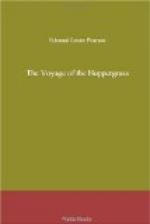Then Eb and the rest of them started to march us back to the village. The news of our capture had spread and there must have been twenty or thirty men and boys waiting for us at the front gate. Some of them had lanterns, and two or three had shot-guns or rifles.
“We left Bailey’s Harbor very modestly,” Mr. Daddles remarked, “but our return is certainly impressive.”
“You better keep your mouth shut, young feller,” said one of the men, “committin’ burglary aint no joke.”
“That’s right, that’s right,” said Gregory the Gauger, who was flitting about from one to the other of us, “an’ whatever may be said against yer, may be used in yer favor, too,—better remember that.”
The constable was still more indignant because the crowd nocked around us.
“Clear outer here! Clear outer here!” he shouted two or three times. But they only laughed at him. Then we set out over the dusty road. First came Eb, with two other men leading Mr. Daddles, then Jimmy and Ed Mason, each securely held, while I was at the end of the procession, gripped by the arm and collar by a tall man, who never uttered a word. At our heels and doing their best to step on my heels whenever they could, came a mob of boys and men.
When we got back to the Harbor, it had quite changed its appearance. From being a dark and deserted place it was now rather lively. There were lights in most of the houses and people waiting in the street.
On our way out of the village, an hour or two before, we had noticed a tent at the edge of the inlet, just above Gregory’s hut. The people in the tent had turned out now,—they were three young men, who seemed to have been camping there. They had hung a lighted Japanese lantern over the door of the tent, and one of the campers was playing on a banjo.
The constable halted the whole procession, and ordered one of his assistants to put the banjo-player under arrest.
“I won’t have it!” he shouted, “he’s disturbin’ the peace!”
Everyone laughed at this,—there was so much noise in the street that the banjo could hardly be heard. But a man went across the road, took the player by the arm, and told him that he must come along. The banjo-player seemed to be perfectly dumb-founded; his friends gathered round, argued, threatened, and finally laughed, and tried to treat the whole thing as a joke. Eb was stubborn, and the man joined our parade, with his banjo under his arm.
The police-station and jail were both in a new building half way up the hill. Into this we were hurried, and the doors were shut.
“Keep ’em all out!” shouted the constable, “keep ’em all out, except members of the possy!”
The “possy” seemed to consist of Eb himself, the men who were guarding us,—five or six of them—and Gregory the Gauger. I never found out just what office he held, but he was clearly the most important man of the lot,—except Eb. The constable leaned his pitchfork against the wall, lighted one or two lamps, sat down behind a desk and put on a pair of spectacles. Then he jerked his head, as if to beckon, toward the banjo-player.




